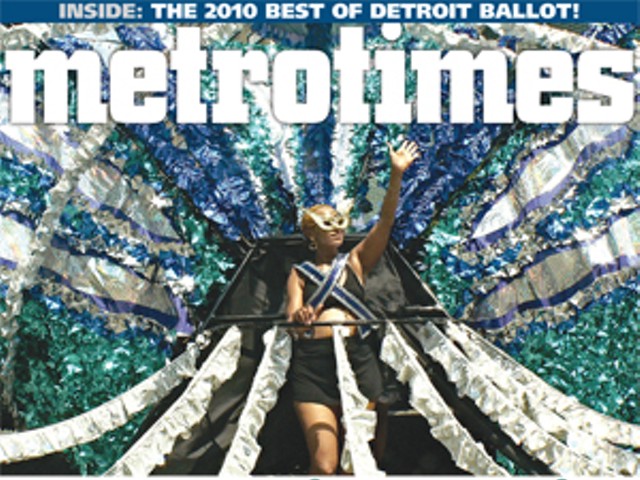When I was a kid, my mother used to make a big jar of honey and fresh-squeezed lemon juice every winter. The thick, bittersweet concoction was our cough medicine, and we would gladly line up for a spoon of that rather than cod liver oil or castor oil — both of which were also freely passed out among us.
Since then, I've wondered whether the honey and lemon actually did us any good. I figure there was vitamin C — which many people take mega-doses of when they have a cold — in the lemon juice. And the honey at least gave you a sugar rush to keep you moving when you were feeling dragged-down. I guess it was at least as useful as most over-the-counter cold remedies out there. Most of them really don't do much of anything.
This past weekend I stopped in for part of the All About Bees conference, held at the Waldorf School in Detroit's Indian Village, and learned that Mom was onto something. I also learned a new word: apitherapy. Apitherapy is the medicinal use of products, such as honey, pollen and bee venom, which are used to treat a range of ailments such as arthritis, gout, respiratory disorders, lumbar back pain and more — there are some 500 disorders that apitherapists treat. Coughs are one of them, so, thanks, Mom, you did your best.
All About Bees was put on by the City Bees (citybeesdetroit.com), with guest speakers from Toronto, Milwaukee, Chicago and several Detroit-area residents. There were sessions on things like how to build a beehive, honey and nutrition, mead-making, working with local government regarding beekeeping ordinances, and more. I got there in the early afternoon (in time for the honey-tasting session) and the first few people I spoke with were all buzzing about the presentation given earlier by Larry Adams on beekeeping and community development. So I sought him out and found out how beekeeping could help save Detroit.
Adams and his wife, Sharon, have worked with the Lindsay Heights/Walnut Way neighborhood organizations in Milwaukee for the past 15 years. The Walnut Way Conservation Corp. is a nonprofit organization with a mission "to sustain economically diverse and abundant communities through civic engagement, environmental stewardship, and ventures for prosperity." In practice that means, urban agriculture, job training, business ventures, youth education, fighting blight and crime, and more. There's a lot more than beekeeping going on there.
The Walnut Way Neighborhood Center (walnutway.org) is housed in a former drug-house murder site. What has been accomplished in the area in the 12 years since the organization incorporated gives me hope that we can turn things around here in Detroit — if community groups can move forward in cooperation with city government.
The Walnut Way neighborhood suffered from the usual litany of urban woes: drugs, home invasions, prostitution, abandoned houses. But now, according to Adams and the Walnut Way website, the gunfire, drug trafficking and prostitution have virtually disappeared from the neighborhood. Sixty-five new homes have been built and occupied, with plans for 52 more. High-production gardens in back yards and formerly vacant lots are part of an education, food processing and sales system.
"There was a time when $200,000 could have bought a whole block," Adams says. "Now we have houses going for that much. We're talking about building wealth in the community."
Milwaukee is where Will Austin's fantastically successful Growing Power urban farm is located. In 2000, Adams took a beekeeping class at Growing Power. He now teaches the class and is beekeeper for Walnut Way, where they harvest 900 pounds of honey each year. That's not exactly a major industry, but it certainly sweetens the pot.
OK, so we're not going to get rich and employ hundreds of thousands of people in an apiary. However, beekeeping can be a key part of the puzzle in community development and neighborhood revitalization. Local kids are attracted to the bees-and-honey scene; the kids cannot get involved, however, until their parents come to an orientation meeting. That pulls the whole family in for the good of all.
"One of the best strategies is that the neighbors know each other and their children," says Sharon Adams. "That's where we live now. We all deserve a place where it is desirable to live, serve and play. Also, the neighborhood is safe because of our active relationships with the city and the police."
That's another aspect of Walnut Way's success. It has been working with city government on several fronts. For instance, at the time Adams started beekeeping it was illegal in Milwaukee, although there was a variance in the zoning law for education. So Walnut Way incorporated beekeeping with their campus of growing, horticulture and agriculture to make it an educational endeavor. That now includes a chapter of the 4H Club for young people. In the meantime, they worked with the city for four years to make beekeeping legal in Milwaukee. A similar process is taking place in Detroit, where it's currently illegal to keep bees. However, there is an urban agriculture ordinance being developed by the Detroit City Council that will also address beekeeping. The word at the conference was to keep your bees on the down-low and, in a couple of years, it will be legal.
I called a couple of city departments to get some information about the legality of beekeeping, but nobody seemed to know who I should talk to. Then I called the Earthworks urban farm, which is run in conjunction with the Capuchin Soup Kitchen. Earthworks keeps bees, and harvested about 700 pounds of honey in 2009 (down from 900 pounds in 2008). The word from there is that the "city has never bothered us about it."
I have digressed, but back to the All About Bees program. Another popular session was Rich Wieske's Beekeeping 101. This was the boot camp for getting started. However, one of my favorites was mead-making presented by Brad and Kerri Dahlhofer from the B. Nektar Meadery (bnektar.com) in Ferndale. Mead is like wine, but made with honey (so you can actually get a buzz from honey). And herein is another tale of economic development in the honey world. Their basement-made mead won some home brewing competitions. In the summer of 2006, Kerri was laid off from her job. While sipping a bit of mead made by her husband, she wondered if they could sell the product. They began developing the business along with their friend Paul Zimmerman. When Brad was laid off in spring of 2008, they went for it whole hog and they opened B. Nectar on Aug. 2 of that year. It was National Mead Day (hey, I didn't know there was a National Mead Day either). And they're still at it.
So there you have it. Keeping bees can be a great tool in community development, and it could well be a tool of health and economic development. Even more, certainly to the City Bees folks, it's a soulful experience. As speaker Candyce Sweda said during the closing panel discussion, "In mythology, bees are a gift from the goddess Venus to the Earth. There is a connection between bees and love. Beekeeping will change your life in ways you never imagined."
Larry Gabriel is a writer, musician and former editor of Metro Times. Contact him at [email protected]





